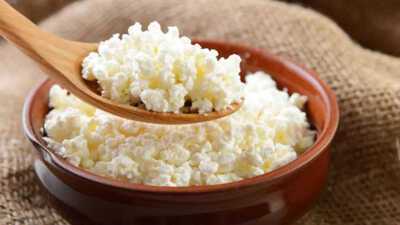One search on the internet can provide you with a queue of recipes that involve cottage cheese. From sandwiches to salads and even pizzas, this dairy staple has had quite a journey from being an ignored to a favoured condiment.
According to Tastewise, in 2024, the cottage cheese sales increased by 9.2% globally, with the North American market accounting for a majority of the growth. It has been the most popular ingredient in salads, followed by toasts, cakes, pancakes and ice creams. And it's going viral for being a good source of protein, a snack, for fitness, meal prep and clean eating. The craze for the dairy staple is only expected to increase. Know more about this popular and trending dairy product below!
What is cottage cheese?

Cottage cheese is a fresh, unripened cheese that is loved for its mild and tangy flavour. The dairy product is prepared by curdling milk with an acid or enzyme and then taking the solid parts after they have left behind the liquid, known as whey. After this, the solid parts, called curds, are separated, drained and seasoned with salt and creamy dressing to give it its signature texture. Its freshness and liquid retention that produce a lighter flavour make it a unique condiment.
Four key minerals that make cottage cheese healthy
A 1/2 cup of cottage cheese provides about 12-15 g of protein with less than 100 calories to burn. For people trying to lose weight, build muscle or tackle conditions such as Type 2 diabetes, the dairy staple is an excellent option with high protein and low calories and carbs.
"Cottage cheese is packed with protein, which helps your body build and fix tissue, keeps you feeling full and supports muscle growth," said Kristen Smith, a registered dietitian nutritionist and spokesperson for the Academy of Nutrition and Dietetics, to USA TODAY.
Cottage cheese is also rich in calcium and phosphorus, which are vital minerals for healthy bones, energy and DNA synthesis. It is also a good source of selenium, a powerful antioxidant that is known for reducing inflammation and thyroid function, and vitamin B12, which is an important nutrient for red blood cell production and brain health.
"Some types of cottage cheese (those made with live, active cultures) can also give you a boost of probiotics – the good bacteria that help keep your gut healthy," adds Smith.
Should cottage cheese be a part of your everyday diet?

Experts don't suggest making cottage cheese a part of your everyday diet. This is because it also contains fat and high sodium. While its fat can increase the bad cholesterol and risk of heart problems, the sodium, which is present in packaged cottage cheese, can also impact heart health.
According to Tastewise, in 2024, the cottage cheese sales increased by 9.2% globally, with the North American market accounting for a majority of the growth. It has been the most popular ingredient in salads, followed by toasts, cakes, pancakes and ice creams. And it's going viral for being a good source of protein, a snack, for fitness, meal prep and clean eating. The craze for the dairy staple is only expected to increase. Know more about this popular and trending dairy product below!
What is cottage cheese?
Cottage cheese is a fresh, unripened cheese that is loved for its mild and tangy flavour. The dairy product is prepared by curdling milk with an acid or enzyme and then taking the solid parts after they have left behind the liquid, known as whey. After this, the solid parts, called curds, are separated, drained and seasoned with salt and creamy dressing to give it its signature texture. Its freshness and liquid retention that produce a lighter flavour make it a unique condiment.
Four key minerals that make cottage cheese healthy

A 1/2 cup of cottage cheese provides about 12-15 g of protein with less than 100 calories to burn. For people trying to lose weight, build muscle or tackle conditions such as Type 2 diabetes, the dairy staple is an excellent option with high protein and low calories and carbs.
"Cottage cheese is packed with protein, which helps your body build and fix tissue, keeps you feeling full and supports muscle growth," said Kristen Smith, a registered dietitian nutritionist and spokesperson for the Academy of Nutrition and Dietetics, to USA TODAY.
Cottage cheese is also rich in calcium and phosphorus, which are vital minerals for healthy bones, energy and DNA synthesis. It is also a good source of selenium, a powerful antioxidant that is known for reducing inflammation and thyroid function, and vitamin B12, which is an important nutrient for red blood cell production and brain health.
"Some types of cottage cheese (those made with live, active cultures) can also give you a boost of probiotics – the good bacteria that help keep your gut healthy," adds Smith.
Should cottage cheese be a part of your everyday diet?
Experts don't suggest making cottage cheese a part of your everyday diet. This is because it also contains fat and high sodium. While its fat can increase the bad cholesterol and risk of heart problems, the sodium, which is present in packaged cottage cheese, can also impact heart health.
You may also like

Actor Adil Hussain Speaks at EPFO's 20th RGDE Event

Gyokeres wonder goal, absent players, embarrassed Saka - Four things spotted in Arsenal training

Ruth Carr fan lands amazing £96,000 bet on day to remember for Yorkshire trainer

Smoking cigarettes not only causes cancer, but it also causes many types of diseases, all of which are fatal.

India Champions Decline WCL Semifinal Clash With Pakistan, Cite Longstanding Opposition





